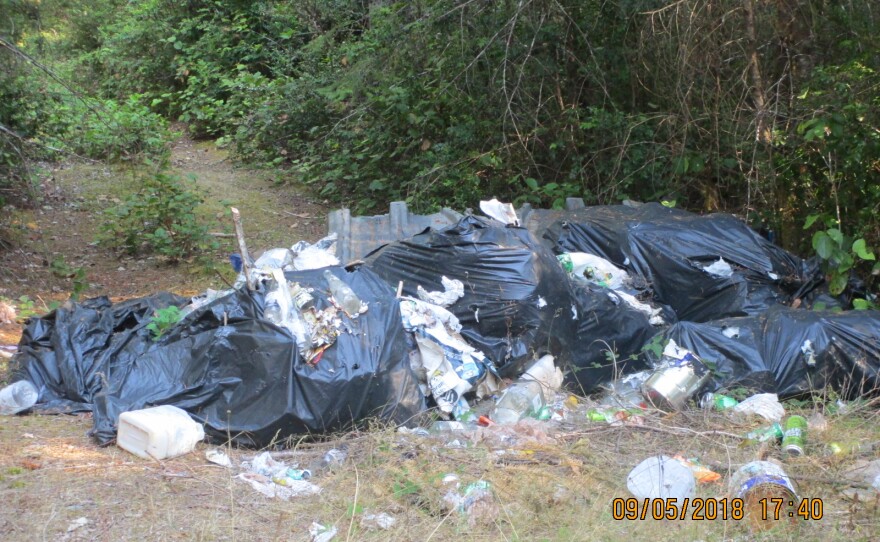Representatives of the state Department of Natural Resources will be in Belfair on Monday evening. They’re meeting with members of the community to address concerns about an unregulated increase in target shooting in Tahuya State Forest.
Residents near the forest have been demanding solutions because of concerns about noise, pollution and public safety.
A year and a half ago, Phil Greenwald was walking his dog on a public road in the forest near his house, when he heard the unmistakable sound of gunfire, about 20 feet in front of them.
“I was terrified for my life," Greenwald said. "I don’t want to get in the way of a bullet that’s shot 50 yards away from me, from high-powered rifles.”
He lives off the grid, about a half mile from an unofficial shooting area in the Tahuya State Forest that’s become increasingly popular. He doesn't walk his dog in the forest anymore; on weekends, he says, the sounds of gunfire can last from early mornings until after sunset. He’s worried about the ecological effects, including the large amount of trash and spent rounds left in the soil near salmon streams. He says he's been waiting two years for DNR to get the shooting to stop.

“They’ve made the promise that they will move it," Greenwald said. "They’ve told us, in fact, that they have three alternate sites to move this.”
But after repeat meetings with the agency, the pit is still there. DNR says they’ve studied the options and none of the alternate sites in the Tahuya really offer better conditions, far enough from homeowners and with earthen backstops to safely catch gunfire and buffer noise. However, they acknowledge the current situation is not sustainable.
Brock Milliern — conservation, recreation and transactions division manager with DNR, who has been working on the problem — says both residents and recreational shooters aren’t happy with it.
“The area that we’re talking about, which is referred to as the ‘Shoefly Pit’ isn’t great for targets shooters – we hear that quite a bit, that it’s actually not the experience that they’re looking for,” Milliern said. “We’ve spent quite a bit of time over the last couple years trying to come up with a better solution in the Tahuya State Forest and we’re struggling to get there, but we’re still working on it.”
He says they’re looking for alternatives, possibly through partnering with other landowners to provide a shooting range outside the state-run forest. And he says if they can find a solution in Tahuya, he’s hopeful that could serve as a model in other places around the state. He estimates there are “a couple dozen” communities struggling with similar conflicts on Washington state lands.
In the meantime, Milliern urges members of the public who have concerns about unsafe or illegal shooting or dumping in state forests to report it, by either calling 911 or contacting DNR. Milliern acknowledges the agency only has 12 officers for 6 million acres of public lands. But he says they want to know what’s happening and can post signs and take other steps to encourage people to respect the law.
Target shooting is allowed on state lands during daylight hours, as long as shooters maintain a distance 500 feet or greater from structures or recreational sites, including roads and trails. They must not endanger people or property.
UPDATE, Dec. 18: Sarah Dettmer, recreation communications manager with the state Department of Natural Resources, said in an email Tuesday that DNR staff met with members of the community this week and decided to temporarily close the Shoofly Pit. The closure is effective Feb. 1.
"We are assembling a work group that includes area residents and target shooters to aid us in finding and developing an alternative shooting area," Dettmer said.















